Migration to Canada, visa request surge, cooperation with Central Asia – interview with Canadian Ambassador
In a recent interview with Kun.uz, Alan Hamson, the Canadian Ambassador to Kazakhstan, Uzbekistan, the Kyrgyz Republic, Tajikistan, and Turkmenistan, discussed the dynamic and evolving relationship between Canada and Uzbekistan. He addressed the hurdles faced by citizens of Uzbekistan in obtaining Canadian visas, clarified the current status of labor migration agreements, and highlighted promising areas of collaboration such as commercial trade, educational exchanges, and regional security initiatives.
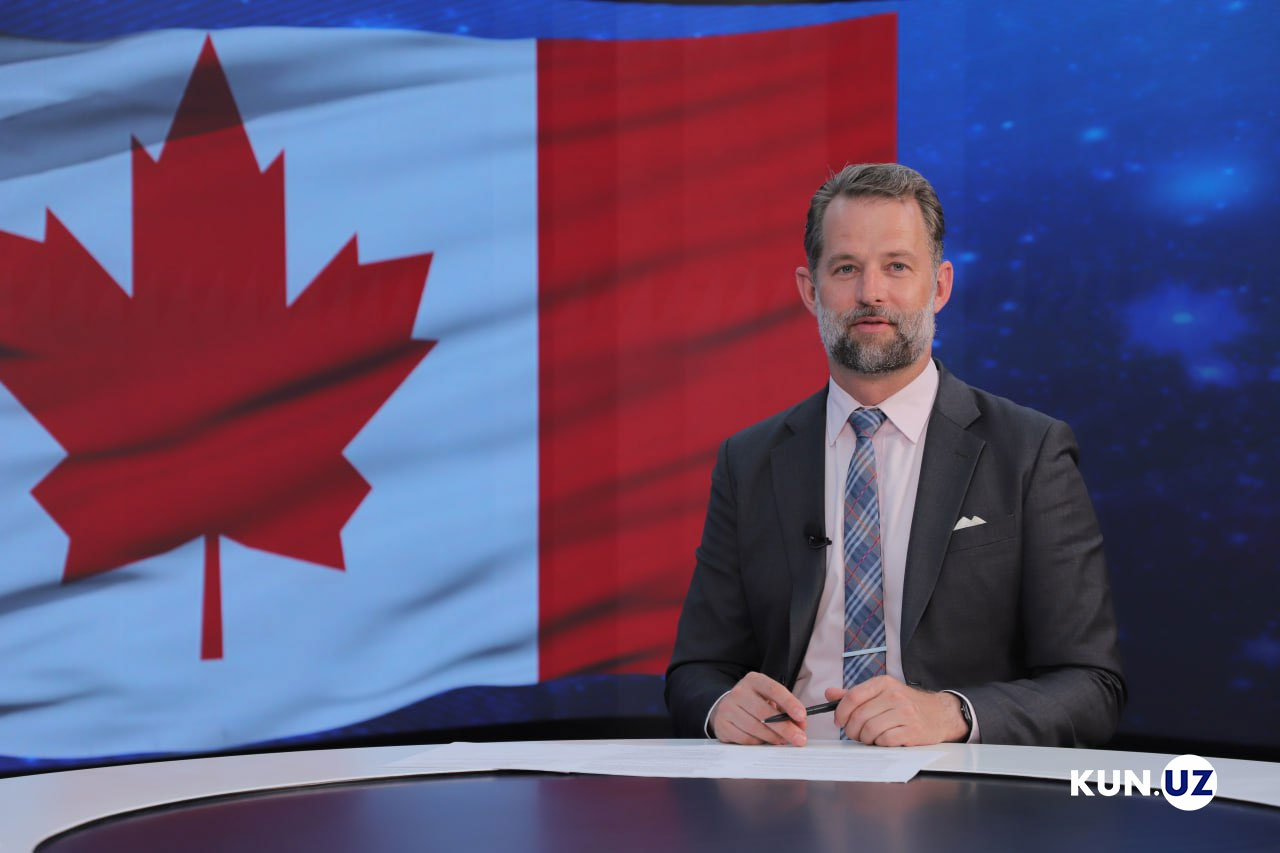
Thank you very much, Ambassador Hamson, for coming over this long distance; we really appreciate your presence in our office. You are based in Astana but at the same time are responsible for maintaining Canada’s relations with five Central Asian countries. It must be challenging. What are some common difficulties you face in your role in this diverse and geographically vast region?
You are absolutely right. We cover the five countries of Central Asia from the Embassy of Canada in Astana, and for sure it means that we are always running to keep up with the dynamism and the opportunities in this region. It's a region that's moving fast, growing fast and changing fast. There's a lot of development and yet we have a small team, hard-working and talented, but small. It's tough to keep up with all the issues and certainly, you cannot be in two places at once. You cannot teleport, unfortunately. So, we have to travel. We do miss some key events, but we try to be at the important conferences, and trade fairs.
In Uzbekistan, there was a dinner of G7 ambassadors with an important dignitary and I made the trip to make sure that I could participate in that forum. So, we try to be here when we can, but for sure if I could teleport or if I had an on-demand helicopter, it would make life a lot easier.
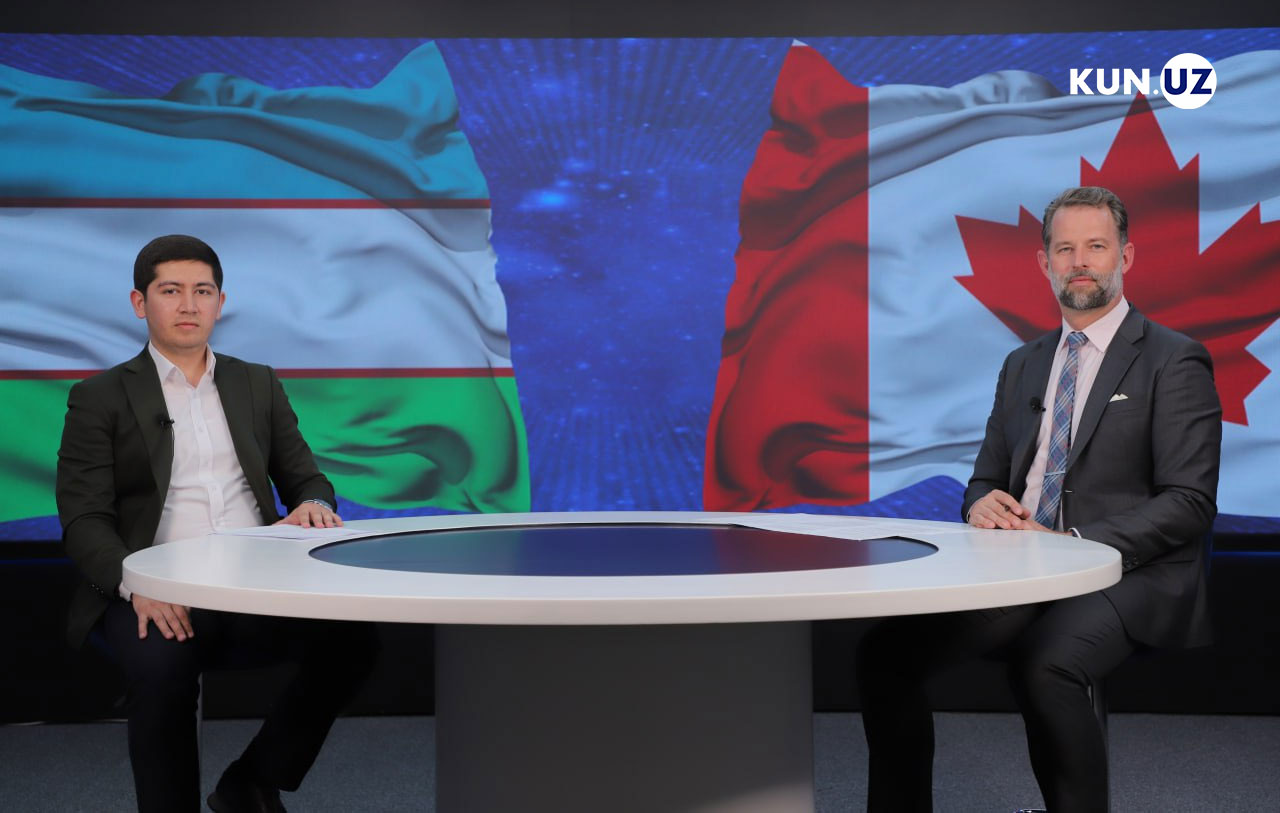
Canada does not have an embassy in Uzbekistan despite it being the most populous country in Central Asia. Are there any specific reasons why the Canadian government decided to operate without an embassy here?
No, there's certainly no obstacle in the sense that we wouldn't want an embassy. I think in an ideal world, we would have 5 embassies in the region because we value our friendship and dialogue with all five countries.
You're right, Uzbekistan is a very important partner with a growing economy and population. So, I see a lot of reasons for us to have a strong presence here and I think that it's down the road. This year is the first year that Canada has represented itself in Uzbekistan from an office in Astana. Before that, our office in Moscow was covering Uzbekistan. But now we are here and a flight from Astana takes less than two hours. So, it’s more convenient.
As for your question, I don’t think that we have any specific reason for not having an embassy here in Uzbekistan. It's just that we have currently a lot of trade with Kazakhstan, and trade with Uzbekistan is also growing. It has a large population. So, the economic partnership is strengthening and I think down the road we'll see how it evolves.
I would love to see an embassy open in Tashkent in the future but right now we're still pleased that we've at least arranged our accreditations in such a way that it allows us to be more present here and it will help us to develop our relationship with Uzbekistan.
Many citizens of Uzbekistan face the inconvenience of traveling to Astana to submit their fingerprints for processing their Canadian travel documentation. Is there any discussion within your government about opening a consulate in Uzbekistan to facilitate this process?
It's indeed an issue that we're aware of. The lack of a visa application center here is a headache for people wishing to travel to Canada. Here, I'd like to clarify the terminology. In our terminology, the consulate is part of our embassy that serves Canadian citizens with, you know, passport renewals or if a baby is born and they need a document; so, this kind of stuff.
We do our visas through a separate ministry, the Ministry of Citizenship and Immigration Canada and right now there's no office of citizenship immigration in Central Asia. There is one in Warsaw and one in Moscow. Their work is transparent to the visa applicant, though.
Visa applicants apply online and then as you rightly pointed out, at a certain stage in the application process, they're invited to put in their biometrics, fingerprints, for example. Right now, the closest place to do that is Almaty, or Astana, or Istanbul. We recognize that it's not ideal, but the main reason behind this is that these centers are private sector, contractors of the Government of Canada, where the government signs long-term contracts that are not renewed month to month; they're renewed in a multi-year span. We have not yet taken the decision to open a visa application center in Tashkent but my hope is that in the future when this contract is renewed, there would be a good opportunity to do it. I'm working on it every day. I think this is certainly one of the biggest issues that people raise with me in Uzbekistan. They would like to see greater people-to-people exchanges, travel for tourism, education, business, or as an immigrant to Canada, and without the visa application center, I know it's a headache. So, we're thinking about it. No commitments have been made yet. No decisions have been made, but we're working on it.
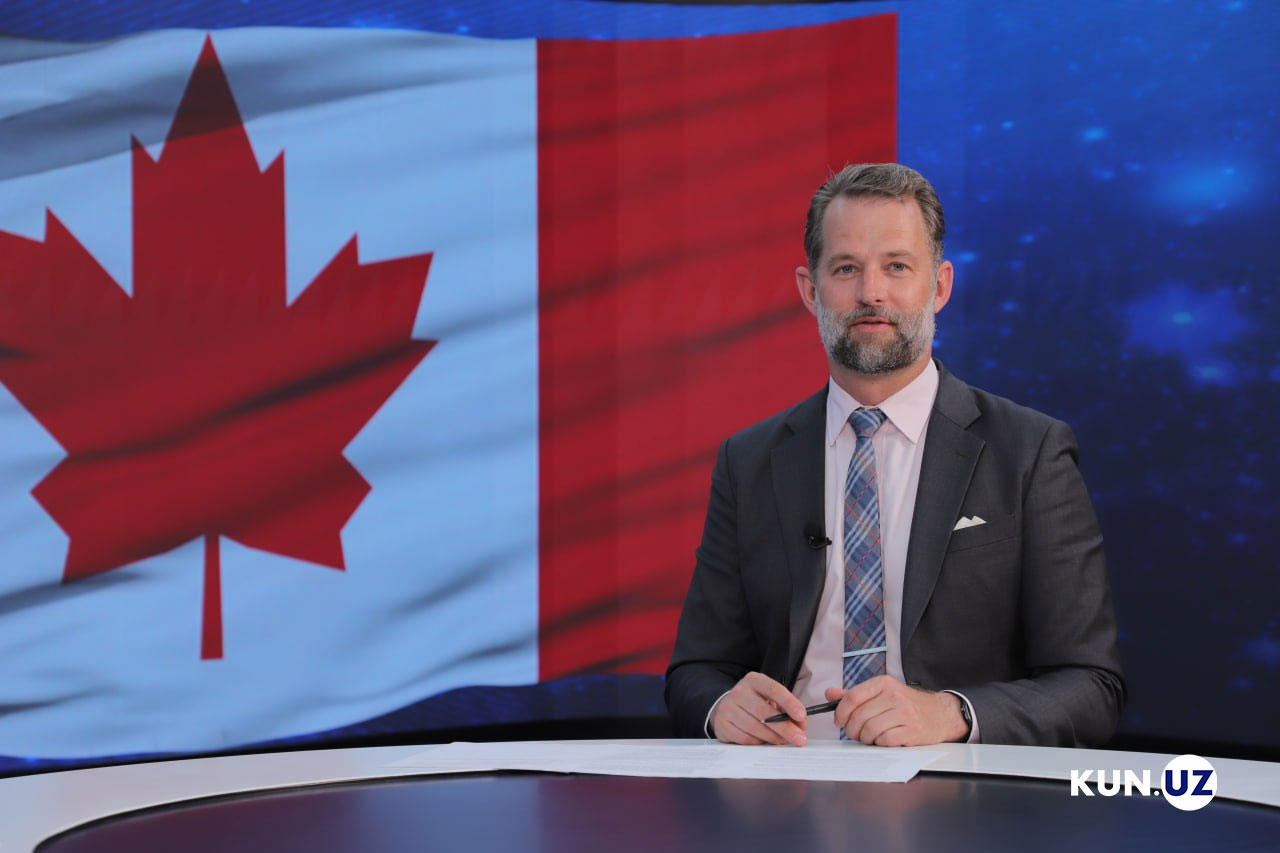
As we notice a growing interest from citizens of Uzbekistan in relocating to Canada, what are the primary migration pathways available, particularly for labor migration, and what preliminary and post-relocation considerations would you suggest?
This is a really important topic. I'm glad you raised it. When I visited Tashkent to present credentials at the end of January this year, I had very useful discussions with different counterparts in the Uzbek government and with the Minister of Employment and Poverty Reduction. There was a lot of interest in the media at that time about migration to Canada for labor migrants and at a later date, I think in maybe March or April, there were some reports online about an agreement with Canada on labor migration. I'd like to clarify that at the moment there's no agreement for labor migration to Canada.
We are well aware of the strong interest here from the government side. I fully understand that it's an important part of the economic and demographic strategy of Uzbekistan to have many partners around the world where Uzbek citizens can go and work, bring home some revenue, acquire new skills, and contribute to the economies there and at home. So, we recognize this is an important and valuable objective. However, right now we don't have an agreement. Certainly, we will inform your viewers on our website and our social media when something is signed. This is actually the point I wanted to really stress, you know, there's a lot of false information out there sometimes because I think it's well-meaning, but people are so interested in this topic that a rumor becomes a story, becomes a fact, even though it's just a rumor. So please follow our website, or our social media on Instagram, which is @canadakazakhstan and my personal account is @Alan_Hamson, you can follow us.
I promise you if we ever have an agreement on labor migration, I'll publish it and everyone will find out about it and we can confirm that it's a reality, but right now there's no agreement.
The other thing I wanted to mention is an issue that we've seen, not exactly here but in the region, examples of people falling victim to fraud from visa consultants who are not legitimate. There are many quality professional visa and immigration consultants around the world, here in Uzbekistan and elsewhere, but I just want to make sure that your viewers take care to avoid giving their money to someone who's not going to help them to have a successful application process. If it sounds too good to be true, if someone tells you they can get you a visa tomorrow, I think this person is just going to take your money. But if you have a reputable, well-established, consultant that has a long history of professional and responsible behavior, maybe that's a better option. Each person has to do their own assessment of who they want to work with or they can apply without a consultant. Many people apply just on the website and in fact, using a consultant does not make it more likely that your visa will be approved, it doesn't draw special attention to the application, but it may help to fill out the form correctly. However, as I have just mentioned, people can do it on their own without a consultant.
I encourage your viewers to be careful. Don't sign black forms and don't give money without getting an invoice as part of an agreement that's written down. These types of things are important to prevent fraud because a lot of people who are really keen to travel to Canada for labor migration, for example, are going to spend thousands of dollars on a consultant. We just want to make sure that it's legitimate and that they're going to realize their dreams and not be taken advantage of. So that's one really important thing I want to share today.
There are lots of travel agencies and visa consulting services here who say they will help with the applicant’s Visitor Visa and after going to Canada, the applicant, supposedly, can easily change his visa to a Work Visa. How true is this?
I might be a little bit out of my area if I get into such processes because I'm from the Foreign Ministry and our visas are handled by a different ministry. I'm not aware of a way to take a Visitor Visa to go and be a tourist and then switch it while you're there to a Work Visa. I don't think such an option exists. There are pathways on the website to apply to go to Canada as a skilled worker, or as an immigrant. We don't have an agreement though or a special program to recruit Uzbeks. There's no such program right now but it doesn't stop people from seeking to travel to Canada.
My strong recommendation for people is to always tell the truth and always fill out the forms 100% and that's the best way to be accepted. If someone says they're going for tourism, but is going to try to change to a work visa, our people will notice this and the application could be rejected. So, it's important to just apply for the visa you want.
Be fully truthful and be careful who you give your money to.
Canada is known for its skilled worker programs that attract global talent. Which particular professions are most in demand?
Well, right now, Canada does not have a skilled worker program with Uzbekistan. To my knowledge, the recruitment of workers to travel to Canada is at a global level and includes the full range of highly skilled workers and specialists to unskilled labor. We have a growing economy, but our demography is such that there are not enough babies being born to maintain the population. So, of course, we recruit people to travel to Canada from overseas for all professions at all levels of skill, but right now there's no specific recruitment program with Uzbekistan.
What specific areas of collaboration between Canada and Uzbekistan seem most promising, and what is Canada's vision for the future of these partnerships?
To be honest, I'm really excited about the partnership with Uzbekistan, especially as somebody who's been coming here as a tourist since 2011. I know how beautiful the country is, how wonderful the people are, the food. I'm looking forward to getting to the airport for my flight out and having a big plov if there's still some left. So, I love Uzbekistan a great deal.
We've had a really positive dialogue with the government here for many years, including when it was covered from our embassy in Moscow. There have been great discussions on regional issues, security, gender equality, environmental protection, and of course commercial cooperation, and business collaboration, which is going really well. Right now, the trade figures between our two countries are about $100 million a year. That's something, but of course, it could be a lot more. Uzbekistan's GDP is $80 billion and ours is also huge; we're a highly developed economy. So, I know that we can grow our commercial cooperation.
Right now, there's a lot of activity in the minerals sector. Uzbekistan is rich in both traditional metals as well as critical minerals. So, there are some Canadian firms operating here as well. There was an agreement earlier this year with Condor Energies, which is a Canadian energy company, to refurbish eight natural gas condensate fields in a really unique partnership with Uzbekneftegaz. So, they're rehabilitating some older fields to make sure that we get the most out of it, and I think that there will be more partnerships possible in the future in energy and in the cleantech that goes with energy to use these fossil fuels as a way of bridging to the renewables and the sustainable economy, carbon-neutral economy of the future that we all need. So, this is going to develop.
There's also a lot of potential commercially in areas like agriculture and agri-food. Canada's technology, machinery, and even genetics are valued around the world in terms of increasing productivity at lower cost, lower pollution, and lower water use. It's really important as we face a lot of uncertainty around water in the future here. So, I'm excited about the potential there.
Also, we can have a great partnership in education. Canada is well known as a destination for higher education. We offer high-quality education and a welcoming environment for people from all around the world. So, we actively recruit students from this region, from Uzbekistan and Central Asia to consider studying in Canada.
I think that there's also a possibility of collaboration in the sphere of transportation linkages.
Finally, one area we've been working on in different countries of Central Asia is women entrepreneurs promoting women in business. There have been some really interesting activities in the region and we hope to expand this in Uzbekistan to talk about digitalization, innovation, and entrepreneurship involving women businesses because women are 50% of the workforce, 50% of the economy. So, we need their full participation in entrepreneurship, in founding and growing businesses to help this country flourish, and to build an economy that works for everyone.
These are some important areas on the commercial side. Beyond that, we have an ongoing dialogue on the government-to-government level on regional issues, for example, on Afghanistan. Afghanistan is a neighbor of Uzbekistan, a country where Canada spent many years heavily engaged in the efforts there. Those efforts did not achieve the result we wanted, but now we have to work together, all countries in the world, to see how we can support the Afghan people, Afghan women, and girls, and of course, regional and global security. I'm proud to say Canada and Uzbekistan have rich dialogue among our senior officials on this topic and I'm glad to see that partnership unfolding.
There are other regional issues, of course. The war in Ukraine, for example. It is a sensitive and difficult issue and it is really painful for us to see what's happening there. I'm really happy to say that the governments in the Central Asian region are showing support for the principles of state sovereignty, territorial integrity, and the UN Charter. This is something that we really welcome as a foundation of a peaceful world based on the sovereignty of States and non-aggression. So, we continue to have these types of dialogues here.
Also, I recognize and really appreciate the way that the governments of Central Asia, all five, have a responsible approach to multiple partners, not feeling the need to choose sides between traditional and new partners in the West, but rather to have a positive and constructive relationship with all sides. This is a great contributor to peace and global security and we support it.
I am hopeful in the future as well that we can do more work on gender equality issues like domestic violence, where there's been some really impressive progress in Uzbekistan in recent years to make the country a safe place for every woman and girl. Canada is very interested in this topic and we're doing some work in Kazakhstan on this issue. I hope we can bring that type of cooperation here. We're working together to see what's the next step.
Finally, we can perhaps work on climate change and water management. We know these are critical issues. Each year we see more and more extreme weather events, issues around water supply, drought, or flooding. We need to find ways to combat climate change and reduce our carbon emissions. We should also think about how we can collaborate on more efficient water usage and transboundary water cooperation. There's a lot to be done there. We don't have a program on this right now with the government of Uzbekistan, but these are some of the ideas I think we should be talking about.
The US has established a C5+1 format for engaging with Central Asian nations. Does Canada consider initiating a similar dialogue to enhance regional cooperation?
Indeed, I've seen the C5+1 format become quite the trend these days, with many countries around the world inviting Central Asian nations’ foreign ministers or even heads of state and heads of government for meetings. I certainly think this is an interesting way to explore and tackle regional issues. However, right now my focus is on building the bilateral relationships one-on-one between Canada and the countries of this region. For example, I'd love to see ministerial visits or other high-level exchanges. I think we need to take some time to build those bilateral relationships and we're not going to jump into a C5+1 format quite yet. Certainly, it's not something we would exclude down the road, but let's focus for now on what we can do together in a bilateral format, and when there are cross-cutting issues we'll find ways to collaborate across countries of the region.
I would say the miniature C5+1 is actually in my embassy because finally, we have one embassy covering the five countries instead of Uzbekistan in the past being covered in Moscow and Turkmenistan being covered in Ankara. So, I'm really happy to see this change. It's a good step and we're trying to do the best we can now to develop the bilateral relationships, and fortunately, we have very positive, friendly relations with all five countries; no bilateral issues of any kind. So, the future is bright for Canada and Central Asian countries’ cooperation.
What cultural or educational exchanges exist between Canada and Uzbekistan, and how do they strengthen bilateral relations?
Right now, there is interest from Uzbek students to study in Canada. We are in the early stages of discussions on higher educational cooperation between Canadian universities and faculties with local partners. The number of agreements signed is not much, but we hope for more in the future. There are some partners here in education like the South Alberta Institute of Technology that deliver training at all levels, vocational training to higher education on a B2B basis and we support that. There are one or two faculty-to-faculty exchanges, but it's still in the early stages.
We would like to see a lot more in the region. We're really putting an emphasis on this approach. For example, we're in advanced discussions in Kazakhstan with the Ministry of Higher Education and Science on the possible establishment of a Canadian university, but in Uzbekistan, we're just getting started and we'll see where we go.
On the cultural side, we don't have a huge program, but we do some niche activities, notably every March-April to celebrate the Spring of the Francophonie. The Francophone is the organization of French-speaking countries and other countries that have a strong link to the French language. We often show Canadian films. We showed two films here in Tashkent in late March and I was here for those screenings. So, that's one way we try to promote Canadian cooperation.
I'd like to do a lot more. It does depend on our time and budget. I can see the richness of the culture in Uzbekistan and some really interesting and surprising links to some traditional Canadian cultural dimensions. So, I'd like to explore that more in the future.
In terms of humanitarian aid and development projects, how is Canada contributing to the Central Asian region, and are there any new initiatives on the horizon?
Yeah, indeed, we do have a number of programs that are active here. For example, a week ago, I was in Termez in southern Uzbekistan with our Immigration Ministry to participate in some activities related to a project we have with the International Organization for Migration. This $50 million project, which has been going on for several years, is designed to support the resettlement of some Afghan migrants and refugees to Canada, but just as importantly, to support local government institutions and local civil society organizations who are providing support to Afghan migrants and refugees in Uzbekistan as well as in Tajikistan and Kazakhstan. We know that the governments of this region are hosting migrants and refugees from Afghanistan, even though it has a cost to them and we'd like to carry some of that cost and contribute by supporting local partners through the International Organization for Migration.
We also have in Uzbekistan two security programs. One of them is a $1.8 million program carried out through the UN Office of Drugs and Crime to combat the trafficking in small arms and light weapons. Obviously, with Afghanistan next door, this is a real concern and we're proud to be supporting the Uzbek government, as well as institutions in Tajikistan and Turkmenistan, to interdict and prevent the smuggling of weapons, which is important for security.
Also, there's a similar $5 million project funded by Canada but delivered by the US Department of Energy. It’s related to detecting and preventing the smuggling of nuclear or radiological material. This is obviously really serious stuff that is important to prevent smuggling and we're proud that we're supporting Uzbek, Tajik, and Turkmen institutions to make sure they have the latest equipment and the latest training in this very important area.
We also have the Canada Fund for local initiatives. It's run by my embassy and has about $560,000 a year spread through the region to support local initiatives at the grassroots level, often in job creation, economic development, and gender equality. In Uzbekistan, we spent $1,000,000 since 2015 through this program and we expect it to increase.
You asked about the broader Central Asian region. We do have other programs as well. I could get into some of them. We have a very large program through the Aga Khan Development Network in Kazakhstan, Tajikistan, and Kyrgyzstan focused on health, education, and gender empowerment. It’s a very interesting project that funds, for example, the University of Central Asia in Naryn, Kyrgyzstan and it has a campus in Khorog, Tajikistan, and there's one coming in Kazakhstan.
There are a few other programs related to nuclear safety in Kazakhstan, which of course had the majority of the nuclear facilities after the end of the Soviet Union and we're supporting the security of those sites to prevent again the proliferation of nuclear materials.
There are also a few other areas of funding through UNICEF for the vaccination of children after the COVID-19 pandemic, which is very important among other issues.
Thank you, Ambassador Hamson, for sharing your valuable perspective with us. Before we conclude, do you have a specific message for the people of Uzbekistan as they look forward to furthering engagement with Canada?
I think the future is bright. We're excited to be here, excited to be working together. I really see this as chapter one of a huge book with many interesting chapters. Of course, it's not the first day that Canada has been in Uzbekistan. We have had diplomatic relations since 1992, but I think being close through the embassy in Astana gives us a chance to explore it more frequently. We hope to work together more. We really appreciate the warm welcome from the government and the people, and I hope that I can meet more people across this country each time I'm here.
Recommended
List of streets and intersections being repaired in Tashkent published
SOCIETY | 19:12 / 16.05.2024
Uzbekistan's flag flies high on Oceania's tallest volcano
SOCIETY | 17:54 / 15.05.2024
New tariffs to be introduced in Tashkent public transport
SOCIETY | 14:55 / 05.05.2023
Onix and Tracker cars withdrawn from sale
BUSINESS | 10:20 / 05.05.2023
Latest news
-
Uzbekistan tops medal table at Asian Cadet Judo Cup in Kazakhstan
SPORT | 18:42 / 05.07.2025
-
Uncertainty grows as new homes remain without gas supply
SOCIETY | 17:46 / 05.07.2025
-
Uzbekistan plans to launch national ferry service in Caspian Sea
SOCIETY | 16:03 / 05.07.2025
-
Dozens of violations, zero accountability: Fergana police cancel fines for chief’s wife’s car
SOCIETY | 16:02 / 05.07.2025
Related News
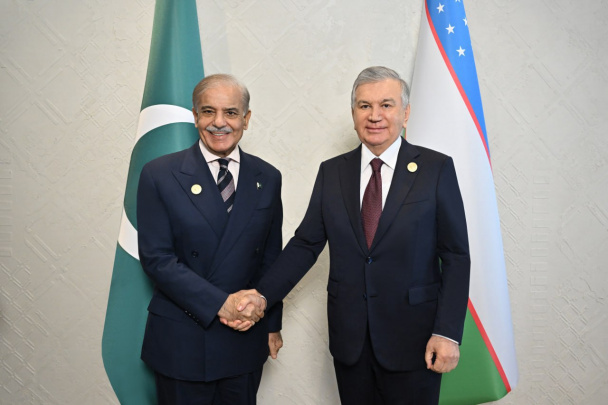
19:04 / 04.07.2025
Shavkat Mirziyoyev holds talks with Shehbaz Sharif, discusses strengthening Uzbekistan-Pakistan strategic partnership
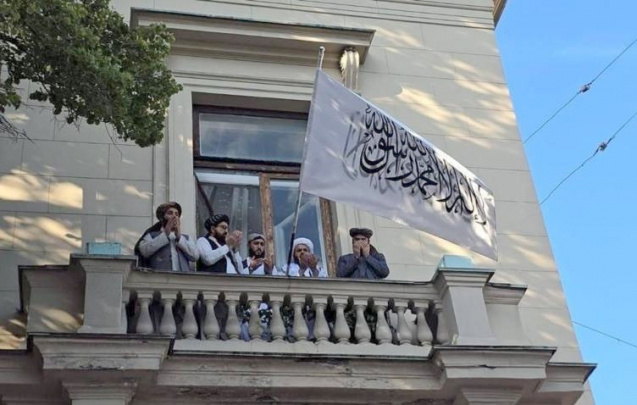
11:49 / 04.07.2025
Russia officially recognizes Islamic Emirate of Afghanistan, eyes economic cooperation
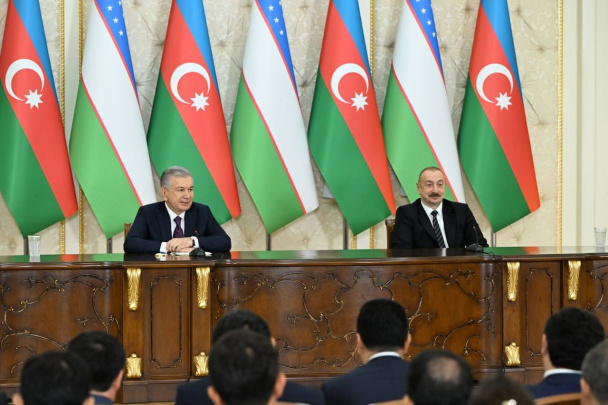
21:36 / 02.07.2025
Mirziyoyev praises Aliyev’s leadership and Azerbaijan’s territorial reunification
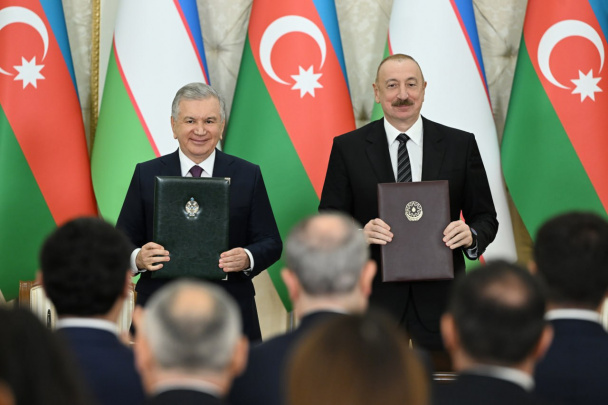
20:21 / 02.07.2025



